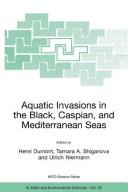| Listing 1 - 6 of 6 |
Sort by
|
Book
ISBN: 9289328215 9789289328210 9789289328203 9289328207 Year: 2014 Publisher: Copenhagen
Abstract | Keywords | Export | Availability | Bookmark
 Loading...
Loading...Choose an application
- Reference Manager
- EndNote
- RefWorks (Direct export to RefWorks)
Arctic marine ecosystems are among the most productive and most vulnerable in the world, both from an economic and ecological perspective of growing accessibility. The complexity of Arctic marine ecosystems and their location poses challenges for management, valuation, and the establishment of sound policy to protect them. This special issue of Temanord presents papers from a workshop devoted to this topic. In October 2013, a group of multidisciplinary experts on marine invasive species and the Arctic came together in Esbjerg, DK for a two-day workshop titled: "Marine Invasive Species in the Arctic: Management Issues". Attendees of the workshop came from academic, governmental and scientific institutions in Denmark and the Faroe Islands, Sweden, Norway, Finland, Iceland, Canada, and the United States. This volume presents papers based on the presentations of the workshop speakers.
Marine biological invasions --- Invasions, Marine biological --- Invasions, Maritime (Biological invasions) --- Marine bioinvasions --- Marine invasions (Biological invasions) --- Maritime invasions (Biological invasions) --- Biological invasions --- E-books --- Exotic marine organisms. --- Introduced organisms --- Marine organisms
Book
ISBN: 163485392X 9781634853927 9781634853910 Year: 2016 Publisher: New York
Abstract | Keywords | Export | Availability | Bookmark
 Loading...
Loading...Choose an application
- Reference Manager
- EndNote
- RefWorks (Direct export to RefWorks)
Marine biological invasions --- Introduced aquatic organisms --- Aquatic organisms --- Introduced organisms --- Invasions, Marine biological --- Invasions, Maritime (Biological invasions) --- Marine bioinvasions --- Marine invasions (Biological invasions) --- Maritime invasions (Biological invasions) --- Biological invasions --- Control --- Government policy --- E-books

ISBN: 1402018665 1402021526 Year: 2004 Volume: 35 Publisher: Dordrecht : Springer Netherlands,
Abstract | Keywords | Export | Availability | Bookmark
 Loading...
Loading...Choose an application
- Reference Manager
- EndNote
- RefWorks (Direct export to RefWorks)
The present volume contains the presentations of a NATO advanced Research Workshop (ARW) entitled “The invasion of the Black, Mediterranean and Caspian Seas by the American Ctenophore, Mnemiopsis leidyi Agassiz: a multidisciplinary perspective and a comparison with other aquatic invasions”, held on 24 - 26 June 2002 in Baku (Azerbaijan). The meeting was ?nanced by the NATO Division for Scienti?c and Environmental Affairs (Brussels); substantial logistic support was provided by the CEP (Caspian Environmental Program) of the GEF in Baku. The Mediterranean, Black, and Caspian Seas represent three fragments of the former Tethys Sea, and are thus of great interest to understanding the evolution of the entire region where Eurasia, Africa and the Arabian Peninsula meet. While the Mediterranean is a typical marine environment, with salinity even a little above the world ocean’s, the Black Sea is a brackish meromictic lake, and the Caspian is a lake with a saline gradient extending from a freshwater basin in the North to a brackish water basin in the South. Intense ?shing activity takes place in all three seas, while maritime traf?c through the Dardanelles and Bosporus, and via the Lenin Canal (between the Don and Volga rivers) to the Caspian Sea has become greatly intensi?ed in the course of the last few decades.
Mnemiopsis leidyi --- Marine biological invasions --- Invasions biologiques marines --- Ecology --- Ecologie --- Beroe ovata --- Zoology --- Health & Biological Sciences --- Invertebrates & Protozoa --- EPUB-LIV-FT SPRINGER-B --- Invasions, Marine biological --- Invasions, Maritime (Biological invasions) --- Marine bioinvasions --- Marine invasions (Biological invasions) --- Maritime invasions (Biological invasions) --- Biological invasions --- Beroe --- Mnemiopsis

ISBN: 1281067679 9786611067670 1402038704 1402029020 9048167450 Year: 2005 Publisher: Dordrecht, Netherlands : Springer,
Abstract | Keywords | Export | Availability | Bookmark
 Loading...
Loading...Choose an application
- Reference Manager
- EndNote
- RefWorks (Direct export to RefWorks)
Biological invasions are a global problem whose local impact can be of great magnitude. The prevention and minimization of the impact of invasive alien species has become a priority because of their negative impact on biodiversity, economy and public health. Effective responses are needed; cooperation and coordination among countries and/or different sectors of society are a must. To combine and share experiences on biological invasions at international, regional and local level it is essential to develop compatible approaches to common problems. With this aim, the GEI (Grupo Especies Invasoras) organised the First National Conference on Invasive Alien Species in Spain in 2003. Scientists coming from different parts of the Iberian Peninsula belonging to universities, public administration, NGOs and environmental enterprises and world-renowned experts on biological invasions from other countries responded to this "call for action" and participated in the conference. Issues in Bioinvasion Science contains key contributions of this conference. The themes included cut across different aspects of non-native species invasions. This volume is essential reading for anyone seeking an understanding of non-native species invasions. Our aim: to go beyond national boundaries in order to tackle these complex biological issues.
Biological invasions --- Marine biological invasions --- Invasions, Marine biological --- Invasions, Maritime (Biological invasions) --- Marine bioinvasions --- Marine invasions (Biological invasions) --- Maritime invasions (Biological invasions) --- Bio-invasions --- Bioinvasions --- Invasions, Biological --- Natural selection --- Population biology --- Nature Conservation. --- Ecology. --- Biodiversity. --- Environmental management. --- Environmental Management. --- Environmental stewardship --- Stewardship, Environmental --- Environmental sciences --- Management --- Biological diversification --- Biological diversity --- Biotic diversity --- Diversification, Biological --- Diversity, Biological --- Biology --- Biocomplexity --- Ecological heterogeneity --- Numbers of species --- Balance of nature --- Bionomics --- Ecological processes --- Ecological science --- Ecological sciences --- Environment --- Environmental biology --- Oecology --- Conservation of nature --- Nature --- Nature protection --- Protection of nature --- Conservation of natural resources --- Applied ecology --- Conservation biology --- Endangered ecosystems --- Natural areas --- Ecology --- Conservation --- Nature conservation. --- Ecology .
Book
ISBN: 354079235X 3642098118 9786611904463 1281904465 3540792368 Year: 2009 Publisher: Berlin : Springer,
Abstract | Keywords | Export | Availability | Bookmark
 Loading...
Loading...Choose an application
- Reference Manager
- EndNote
- RefWorks (Direct export to RefWorks)
Biological invasions are considered to be one of the greatest threats to the integrity of most ecosystems on earth. This volume explores the current state of marine bioinvasions, which have been growing at an exponential rate over recent decades. Focusing on the ecological aspects of biological invasions, it elucidates the different stages of an invasion process, starting with uptake and transport, through inoculation, establishment and finally integration into new ecosystems. Basic ecological concepts - all in the context of bioinvasions - are covered, such as propagule pressure, species interactions, phenotypic plasticity, and the importance of biodiversity. The authors approach bioinvasions as hazards to the integrity of natural communities, but also as a tool for better understanding fundamental ecological processes. Important aspects of managing marine bioinvasions are also discussed, as are many informative case studies from around the world.
Marine biological invasions. --- Marine biological invasions --- Earth & Environmental Sciences --- Ecology --- Marine Science --- Biological invasions. --- Bio-invasions --- Bioinvasions --- Invasions, Biological --- Invasions, Marine biological --- Invasions, Maritime (Biological invasions) --- Marine bioinvasions --- Marine invasions (Biological invasions) --- Maritime invasions (Biological invasions) --- Life sciences. --- Animal ecology. --- Aquatic ecology. --- Conservation biology. --- Ecology. --- Wildlife. --- Fish. --- Marine sciences. --- Freshwater. --- Life Sciences. --- Freshwater & Marine Ecology. --- Life Sciences, general. --- Animal Ecology. --- Marine & Freshwater Sciences. --- Fish & Wildlife Biology & Management. --- Conservation Biology/Ecology. --- Natural selection --- Population biology --- Biological invasions --- Aquatic biology. --- Marine Sciences. --- Wildlife management. --- Nature conservation --- Animal populations --- Game management --- Management, Game --- Management, Wildlife --- Plant populations --- Wildlife resources --- Natural resources --- Wildlife conservation --- Ocean sciences --- Aquatic sciences --- Animals --- Zoology --- Biosciences --- Sciences, Life --- Science --- Hydrobiology --- Water biology --- Biology --- Management --- Aquatic ecology . --- Ecology . --- Balance of nature --- Bionomics --- Ecological processes --- Ecological science --- Ecological sciences --- Environment --- Environmental biology --- Oecology --- Environmental sciences --- Fish --- Pisces --- Aquatic animals --- Vertebrates --- Fisheries --- Fishing --- Ichthyology --- Fresh waters --- Freshwater --- Freshwaters --- Inland water --- Inland waters --- Water --- Aquatic biology
Book
ISBN: 4431546782 4431538585 9786612831546 4431538593 1282831542 Year: 2010 Publisher: Tokyo : Springer,
Abstract | Keywords | Export | Availability | Bookmark
 Loading...
Loading...Choose an application
- Reference Manager
- EndNote
- RefWorks (Direct export to RefWorks)
Loss of biodiversity on tropical and subtropical oceanic islands is one of the most pressing conservation issues. These oceanic islands are well known for their unique fauna and ? ora, which evolved over long periods in isolation from external perturbation. However, the maj- ity of these islands in the Paci? c were eventually settled by Polynesians and then by Europeans; by about 200 years ago, only a few island groups remained untouched. The Bonin Islands are one of these groups. The Bonin Island group is one of the most remote in the world. The islands are located 1,000 km south of Japan off the eastern fringe of Eurasia. They were ? rst discovered by the Japanese in 1670, settled by Westerners from Hawaii in 1830, and ? nally recognized as a Japanese territory in 1862 on condition that previous settlers would be protected and allowed to remain with full rights. Because of this complicated history, the Bonins have two names.
Introduced organisms -- Control -- Japan -- Bonin Islands. --- Introduced organisms -- Japan -- Bonin Islands. --- Island ecology. --- Introduced organisms --- Island ecology --- Biology --- Earth & Environmental Sciences --- Ecology --- Biology - General --- Health & Biological Sciences --- Control --- Marine biological invasions --- Biodiversity conservation --- Bonin Islands (Japan) --- Biodiversity --- Biological diversity conservation --- Conservation of biodiversity --- Diversity conservation, Biological --- Gender mainstreaming in biodiversity conservation --- Maintenance of biological diversity --- Preservation of biological diversity --- Invasions, Marine biological --- Invasions, Maritime (Biological invasions) --- Marine bioinvasions --- Marine invasions (Biological invasions) --- Maritime invasions (Biological invasions) --- Conservation --- Ogasawara-guntō (Japan) --- Ogasawara Islands (Japan) --- Life sciences. --- Ecology. --- Biodiversity. --- Plant science. --- Botany. --- Zoology. --- Nature conservation. --- Life Sciences. --- Nature Conservation. --- Plant Sciences. --- Conservation of natural resources --- Ecosystem management --- Biological invasions --- Botanical science --- Phytobiology --- Phytography --- Phytology --- Plant biology --- Plant science --- Natural history --- Plants --- Animals --- Conservation of nature --- Nature --- Nature protection --- Protection of nature --- Applied ecology --- Conservation biology --- Endangered ecosystems --- Natural areas --- Biological diversification --- Biological diversity --- Biotic diversity --- Diversification, Biological --- Diversity, Biological --- Biocomplexity --- Ecological heterogeneity --- Numbers of species --- Balance of nature --- Bionomics --- Ecological processes --- Ecological science --- Ecological sciences --- Environment --- Environmental biology --- Oecology --- Environmental sciences --- Population biology --- Ecology . --- Floristic botany
| Listing 1 - 6 of 6 |
Sort by
|

 Search
Search Feedback
Feedback About UniCat
About UniCat  Help
Help News
News